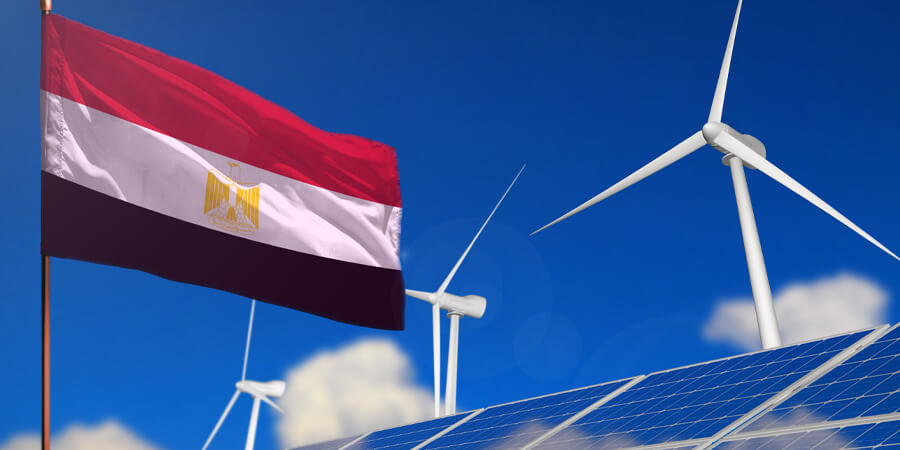Egypt, known for its ancient wonders and rich cultural heritage, is now making waves in the realm of renewable energy. Spearheading this transformation are the nation's telecom leaders, who are driving the expansion of wind energy with innovative initiatives and strategic investments. Their efforts not only mark a significant shift towards sustainability but also contribute to Egypt's ambitious renewable energy goals.
The Synergy between Telecom and Renewable Energy
The telecom industry, synonymous with technological advancements and connectivity, has found a natural ally in renewable energy. In Egypt, this collaboration is particularly evident in the domain of wind energy. Telecom companies, with their extensive infrastructure and technical expertise, are wellpositioned to lead the charge towards a greener future.
One of the driving factors behind telecom companies' foray into wind energy is the substantial power consumption associated with their operations. From base stations to data centers, telecom networks require a continuous and reliable power supply. By harnessing wind energy, telecom operators not only reduce their carbon footprint but also mitigate operational costs in the long run.
Tech-Driven Transformation
Technological innovation drives wind energy integration in Egypt's telecom sector, enhancing efficiency and sustainability. IoT devices optimize turbine performance by collecting real-time data on wind conditions. AI enables predictive maintenance, reducing downtime and maximizing output. Drones conduct detailed inspections, enhancing safety. These advancements revolutionize renewable energy production, aligning with Egypt's environmental goals. As Egypt invests in renewable energy, technology will play a pivotal role in achieving a more eco-friendly future.
Environmental Sustainability
Telecom leaders' adoption of wind energy represents a significant stride towards environmental sustainability, pivotal for achieving global climate change mitigation goals. By integrating wind energy into their operations, these companies actively reduce their carbon footprint, contributing to the global effort to curb greenhouse gas emissions. This transition away from fossil fuels is crucial for mitigating air pollution and preserving natural ecosystems.
Moreover, the shift towards wind energy aligns with broader sustainability objectives outlined in international agreements like the Paris Agreement. By embracing renewable energy sources, telecom leaders not only demonstrate corporate responsibility but also contribute to the global transition towards a low-carbon economy. This transition fosters innovation and economic growth while promoting social development.
In essence, telecom leaders' adoption of wind energy underscores their commitment to environmental stewardship. By reducing carbon emissions and promoting renewable energy, these companies play a vital role in addressing climate change and paving the way for a sustainable future.
Economic Implications
The adoption of wind energy by telecom companies in Egypt not only yields economic benefits for the companies themselves but also has far-reaching implications for the broader economy. Consider a scenario where a telecom company, operating a vast network of base stations and data centers across the country, decides to transition to wind energy. By harnessing wind power to meet its energy needs, the company can achieve significant cost savings in the long run. These savings result from reduced expenditures on fossil fuels and lower operational costs associated with traditional energy sources.
Furthermore, the cost savings generated from wind energy adoption can be reinvested into various areas, thus driving economic growth. For instance, the telecom company may allocate funds towards infrastructure development and expansion projects. This could involve upgrading network infrastructure, enhancing connectivity, and improving service delivery to customers across Egypt. Additionally, the increased investment in renewable energy projects, such as wind farms, stimulates job creation across various sectors of the economy. Jobs are created in manufacturing wind turbines, constructing wind farms, and maintaining renewable energy infrastructure.
Overall, the economic benefits of wind energy adoption extend beyond the telecom companies themselves, contributing to overall economic growth, job creation, and sustainable development within the broader Egyptian economy. This illustrates how the transition to renewable energy not only aligns with environmental sustainability goals but also brings about positive economic outcomes for the country as a whole.
In conclusion, telecom leaders in Egypt are at the forefront of the wind energy revolution, driving the country towards a greener and more sustainable future. Their efforts not only showcase the transformative potential of renewable energy but also underscore the pivotal role of the private sector in driving environmental change. As Egypt continues its journey towards energy independence, telecom companies stand as beacons of innovation and sustainability in the evolving landscape of renewable energy.








